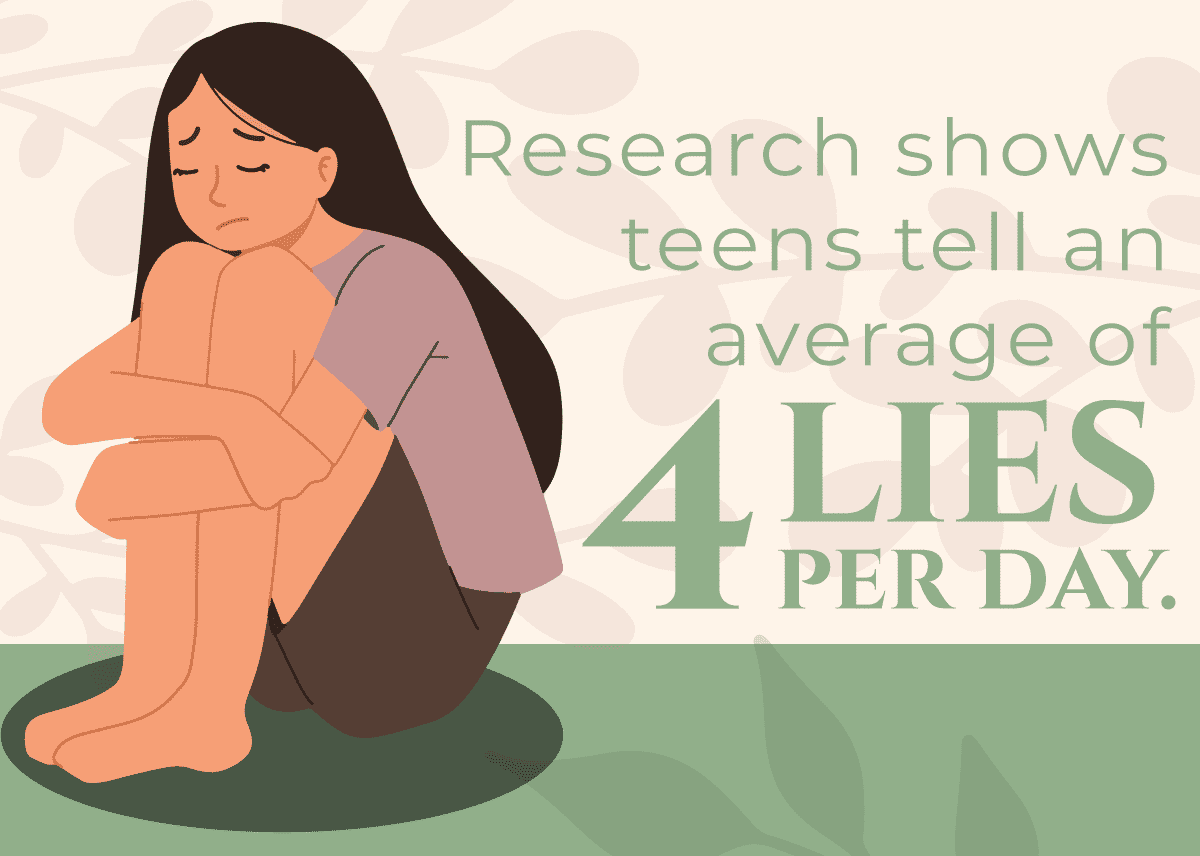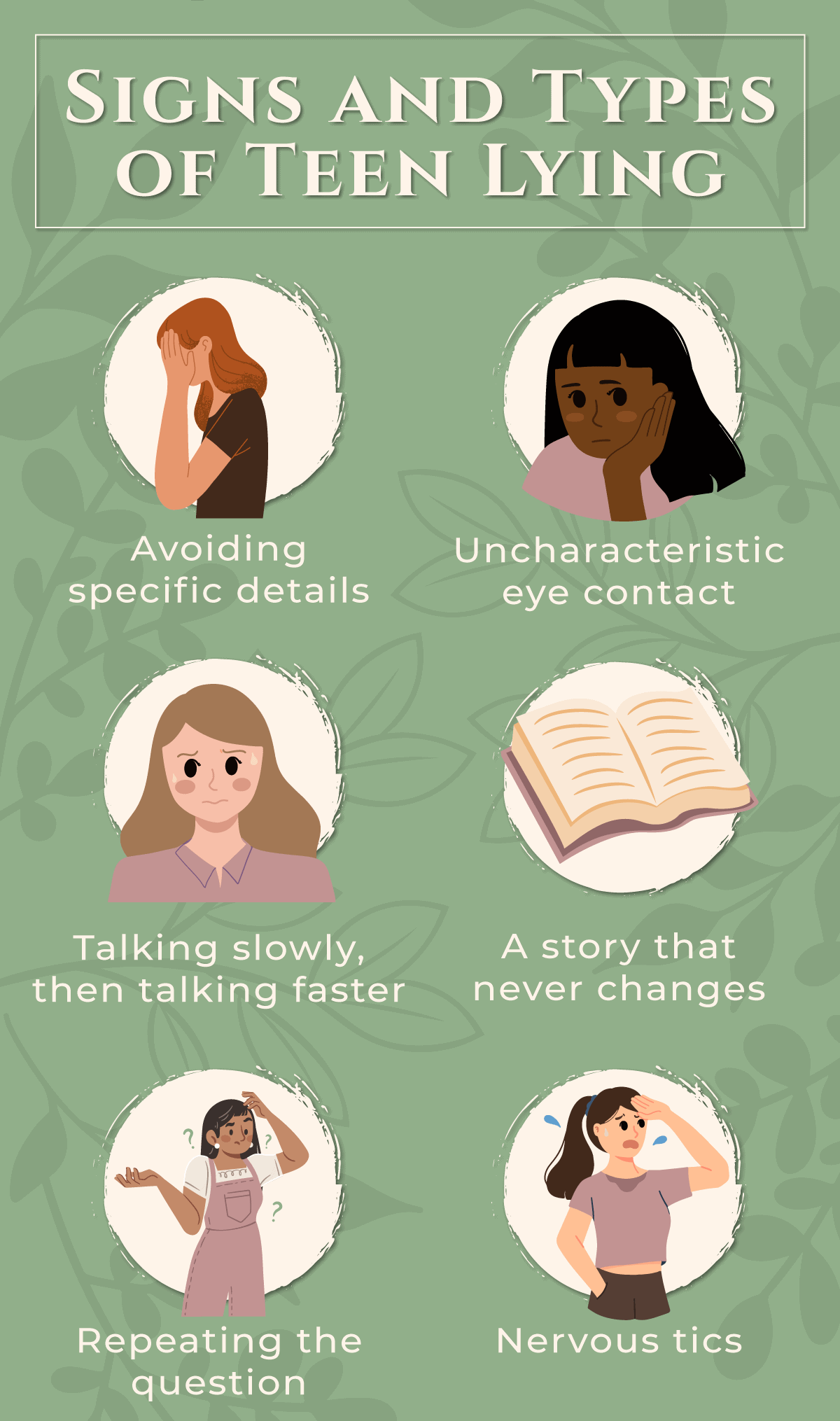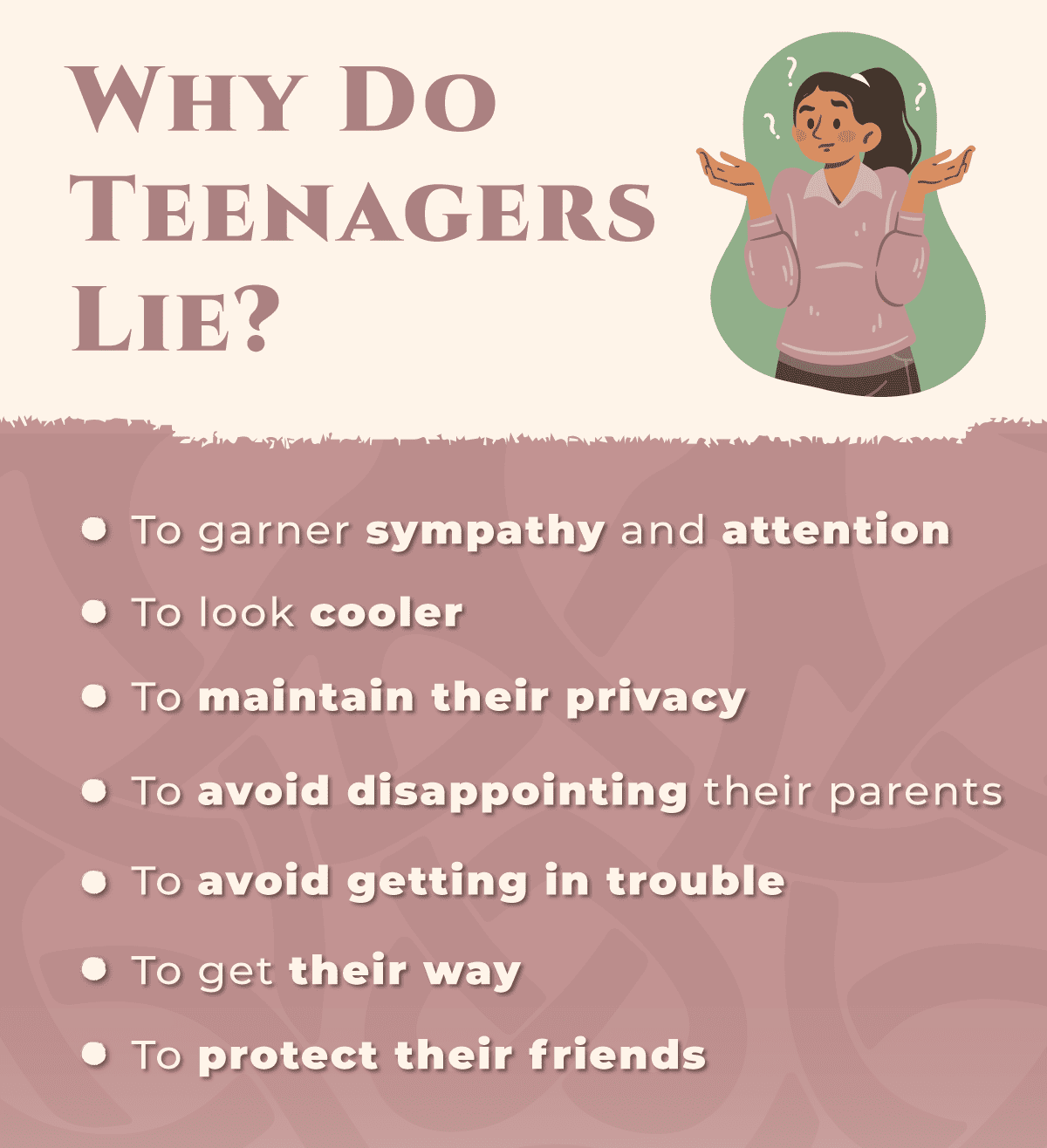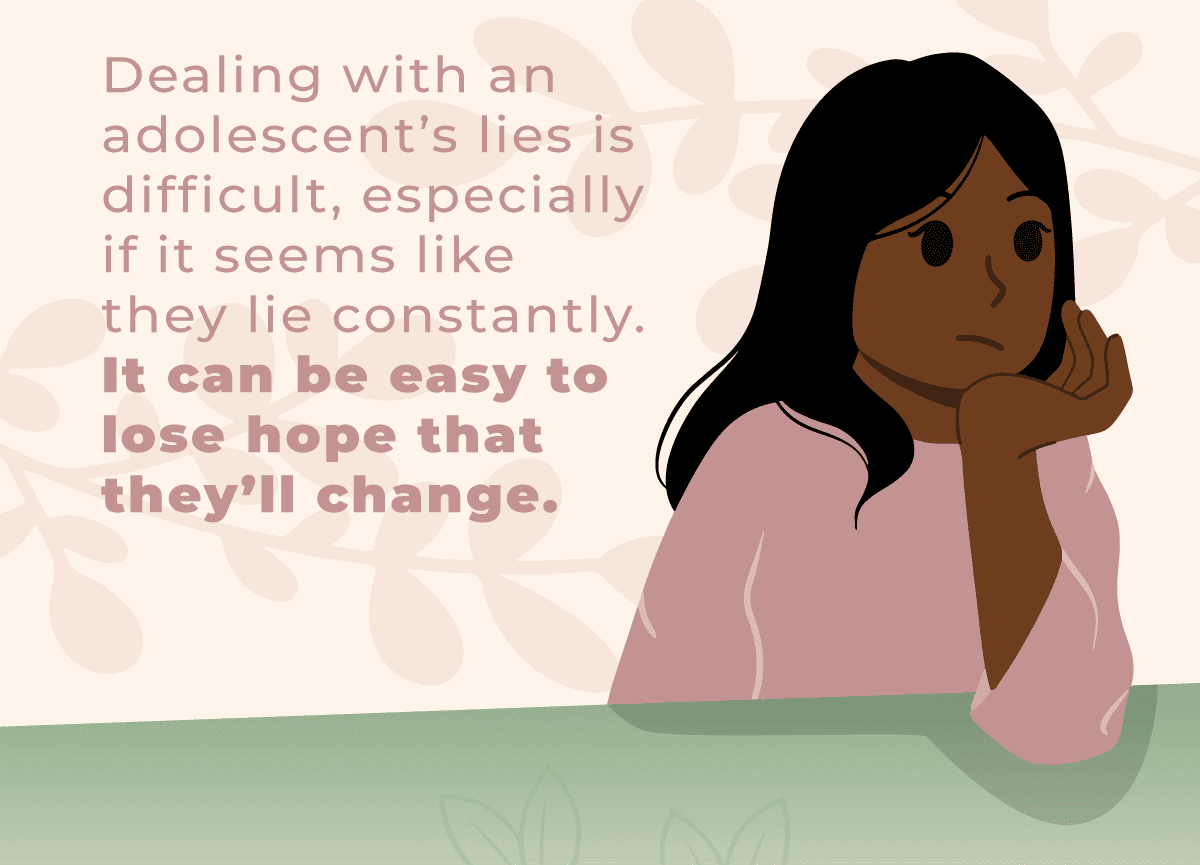On Monday, your daughter tells you she got a 100 on the geometry exam she spent so much time studying for the week before. On Tuesday, you find a geometry exam marked with a 68 in the trash. Wednesday, your daughter informs you she wants to study for her next exam at her friend’s house, and you hesitate this time. If she was studying, surely she would’ve gotten a higher score on her exam, and why did she lie to you about it in the first place? You know you should talk to her about it, but will it be a productive conversation? Why is your teenager lying, and what should you do about it?
Research shows teens tell an average of four lies per day. To some degree, it is a normal part of growing up. Roots Renewal Ranch knows that after spending so much time working with teen girls. That doesn’t mean it’s right, though, and if you’re in the situation of the parent above, a confrontation is necessary. Let’s talk about why teens lie, and how to help them grow into honest adults.

What Do Teens Lie About?
If you’re a parent of an adolescent, you probably know the answer to this question already. Teens lie about the grades they got on tests, the friends they’re hanging out with, how they’re spending their time, what they’ve accomplished, and more.

The Way Teenagers Lie: Signs and Types of Teen Lying
Recognizing dishonesty in teens is not unlike recognizing it in adults. Teens are often worse liars because they’ve had less practice. These signs don’t guarantee someone is lying, but they’re important to keep in mind when talking to your teenager:
- Avoiding specific details. Lying teens usually won’t be able to tell you tiny things, like times they did things, exactly what they said in conversations, or the names of people they were with. This can be because they didn’t think of these details to lie about ahead of time, or they know you may be able to ask someone they claim is involved if what they say is true.
- Uncharacteristic eye contact. The most thought-of sign of lying is breaking eye contact and fidgeting, but some teens may intentionally make eye contact when they lie. If your teen is looking away or staring you dead in the eyes when they usually do the opposite, it’s suspicious.
- Talking slowly, then talking faster. Lying teens sometimes need extra time to think up a convincing answer, but once they do, the nerves that come with lying might take over and make them talk quickly the more they speak.
- A story that never changes. A common belief is that liars will eventually tell stories that don’t add up, and that can be true, but a teen lying may also memorize their story in hopes of avoiding any inconsistencies. People telling the truth actually tend to remember more details of the event over time, and add them to their story when they tell it repeatedly.
- Repeating the question. An adolescent lying may ask you to repeat a question to buy themselves more time to think of a lie. This includes, “Sorry, what?” or repeating the question back to you verbatim to “confirm” they understand what you’re asking.
- Nervous tics. After a lifetime of raising your child, you know some things they do when they’re nervous. These habits are often subconscious, and hard to break, even when lying. If you notice them in your teen, that’s a sign they might be lying.
Remember, if your teen is telling you sensitive information, they may be nervous to tell you or want to make sure they tell you the right way. This can make it look like they’re lying when they’re not, so keep that in mind when judging the situation.

Why Do Teenagers Lie? Reasons for Teen Lying
Empathy is the key to any conversation, and to empathize, you need to understand where your teen is coming from. These are the common reasons teens lie:
- To garner sympathy and attention. Sometimes, teens are looking for reassurance, even if it’s for something that didn’t happen.
- To look cooler. Status is important to adolescents, so they may lie about having certain material objects or experiencing certain things to appear more impressive to their peers.
- To maintain their privacy. The teenage years are when children slowly gain autonomy from their parents. Oftentimes, teens want autonomy even when they shouldn’t have it yet. Sometimes they’ll lie about what they’re doing on their phone or where they’re going because they want it to be their business alone.
- To avoid disappointing their parents. Parental figures are the number one authority figures in children’s lives, and that desire to please them doesn’t go away, even as they age. Chances are, even as an adult, you still don’t want to disappoint your parents. It’s easier for teens to lie about a bad grade or something embarrassing than to feel like they’re letting their parents down.
- To avoid getting in trouble. Doing anything to avoid getting in trouble is like an instinct for kids. For some children, that means following the rules, and for others, that means breaking the rules and lying about it. Teens often don’t like conflict, and they like facing consequences and losing privileges even less.
- To get their way. Adolescents are often impulsive and more likely to do anything to get their way. If they want that new video game console, they might lie about all the good things they’ve done to deserve it. They also might lie their way through an extra credit assignment for some additional points added to their grade.
- To protect their friends. Some teens may lie out of loyalty. Just like they don’t want to get in trouble themselves, they don’t want their friends to experience any of the consequences that come with ugly truths.
Compulsive Lying in Teenagers
In some cases, teens might not be able to stop lying, or may believe the lies they tell. This could indicate a more serious concern, such as a mental health condition like ADHD, bipolar disorder, anxiety, borderline personality disorder, antisocial personality disorder, or others. If this is the case for your teen, they may require help from a mental healthcare professional.

How to Handle Teenagers Lying: Establishing Honesty with Your Teen
Understanding why adolescents lie is a good first step, but that doesn’t solve the problem of them lying. There are several things you can do to foster an environment of trust with your teen where they will feel like they don’t have to lie to you.
Serve as an Honest, Positive Role Model
Kids see what their parents do, and learn by example. If you lie to your husband about spending money on organic vegetables when you actually spent it on a new handbag and your teen knows it, they’ll take it as a sign they can lie like that too. Worse, if you try to call them out for lying, they might think you’re a hypocrite. The best thing to do is live as an example to your adolescent. Be honest about what you would want them to be honest about. If you have a friend call you for help and you don’t feel up to it, tell them that, instead of fibbing about having something else to do.

Be Prepared to Hear the Truth, Even if It’s Ugly
Whether it’s a poor grade on a test or something as serious as a substance use disorder, you need to stay calm when your teen is honest with you. If your teen knows you tend to freak out when they do something against your expectations of them, they’ll go to greater lengths to lie and hide more from you in the future.
Instead, make sure you’re open to a real conversation with your teen. Instead of getting combative when accusing them of lying, ask them why they’re lying to you. A level-headed, “I don’t believe you. Why are you lying to me?” can go a long way, especially if your teen knows you genuinely want to talk about it.
Your teen may get defensive no matter how calmly you accuse them of lying. You’ll still want to stay calm. Issue the consequences you see fit, such as grounding them, or taking certain privileges away, but make sure they know they can talk to you about the truth when they’re ready.
Even if your teen doesn’t have any problems with lying, focus on fostering an environment of trust to keep it that way. Express genuine interest in your teen’s life, and refrain from getting angry with them over their mistakes whenever you can. Nobody’s perfect. Your teen will mess up and lie sometimes, and you’ll inevitably mess up and get angry sometimes, too. What matters most is that you keep trying, and never give up on your teenager.

Don’t Label Teens as Liars, No Matter How Much They Lie
Humans rely on labels to understand the world, but labeling your teen as a liar is only harmful, no matter how big of a problem their lying becomes. If a teen feels like you’ve given up on them, the chances of them giving up on being the person you want them to be increases. They might think, “Well, mom already thinks I’m a liar, so what’s the point in stopping?” You don’t want to push your teen toward that mindset. Instead, always keep their good qualities in mind, and have hope that they can change and grow into an adult with good character. Always believe in them, and make sure they know it.

How to Help Your Teen Live an Honest and Healthy Life in Fort Worth, Texas
Dealing with an adolescent’s lies is difficult, especially if it seems like they lie constantly. It can be easy to lose hope that they’ll change. If it feels like your teen’s lies are out of control and nothing you do is working, there may be something more serious at play, like an undiagnosed mental health condition. We encourage you to get in touch with a mental healthcare professional who offers therapy for teenagers and can help you come up with a solution.

Roots Renewal Ranch is a mental healthcare facility for girls ages 13-17 located in the Dallas-Fort Worth area. Whether your teen is lying due to an undiagnosed mental health condition or lying about a substance use disorder, we’re here to lead her toward a healthy life through comprehensive, trauma-informed care. Give us a call at 888-399-0489, and together we’ll remind your daughter that she is enough, and worthy of a healthy, fulfilling life.
FAQs
How do you discipline a teenager for lying?
Some ideas for consequences your teen will face if they lie include taking away privileges, grounding them, requiring they repair any damage their lie has done to others, and potentially, therapy.
How do you break a teen’s lying habit?
Consistent consequences for lying are important, but so is teaching your child you won’t have an extreme reaction when they tell you the truth. Make sure they know you care about the truth of what’s happening in their lives, and foster an environment of trust long-term. Serve as an example of honesty, and never give up on your teen, but don’t deal with it alone if it’s difficult. Consider enlisting the help of a mental healthcare professional.
Click to copy and share:

